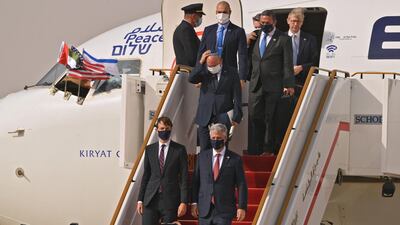This week, a US-Israeli delegation headed by White House senior adviser Jared Kushner departed from Tel Aviv and landed in Abu Dhabi aboard a commercial flight, the first of its kind to the Gulf. The delegation discussed co-operation in a variety of fields, including trade, agriculture and technology following the signing of the Abraham Accord on August 13. The agreement states that the UAE has decided to establish diplomatic ties with Israel in exchange for halting the annexation of Palestinian land.
The UAE is now the first country in the Gulf to establish formal relations with Israel. The ensuing agreements stemming from the accord are still being rolled out, but perhaps the most compelling are the many opportunities the accord can open. Mr Kushner laid out Washington's vision for a peaceful Middle East in an interview with The National.
Mr Kushner referred to the Abraham Accord, which he helped to broker, as a “a big turn for optimism” and repeated Mr Trump’s commitment to a two-state solution to the Palestinian-Israeli conflict. This assurance is crucial to peace efforts between Israelis and Palestinians. The UAE’s commitment to the two-state solution remains unwavering, and preserving it was among the drivers for the peace accord. In a video addressed to the Palestinian community of the UAE, Sheikh Abdullah bin Zayed, Minister of Foreign Affairs and International Co-operation, reaffirmed the Emirates’ support. For the UAE, peace-building is a “strategic necessity” in a region rife with conflict, but Sheikh Abdullah maintained that it will never “come at the expense of our support for the Palestinian cause”.
The US and the UAE have publicly stated their support for a two-state solution several times since the Abraham Accord was announced. It is now up to Israelis and Palestinians to build on these efforts for a peaceful resolution of the conflict, with the mediation of Arab and Western allies. A major part of the drive for peace lies in empowering Palestinians through investment in the economy and strengthening their institutions, according to Mr Kushner.
In a joint US-UAE-Israeli communique on August 13, the three nations stated that they will keep striving to "achieve a just, comprehensive and enduring resolution to the Israeli-Palestinian conflict" and that the agreement will lead to "better lives for the peoples of Israel, the UAE and the region".
Achieving a peaceful Middle East requires, however, a broader perspective, which includes supporting reformers, creating opportunities and supporting geopolitical stability. That means curbing Iranian influence in the Arab world. Tehran’s armed proxies have wreaked havoc in Yemen, Lebanon, Iraq and beyond, destabilising entire nations and fuelling extremism. The US’s maximum pressure campaign has hindered these activities to a great extent, but punitive actions must also be complemented by diplomatic efforts. This includes building closer ties with reformers like Iraqi Prime Minister Mustafa Al Kadhimi, as well as renegotiating a new, better nuclear deal with Iran. The now-defunct Joint Comprehensive Plan of Action, from which the US withdrew in 2018, had failed to address Tehran’s destabilising actions. Should he win a second term, Mr Trump will focus on striking “the right deal” with Iran, according to Mr Kushner.
The path to peace in the Middle East is multi-faceted and requires a holistic approach. It requires effort and compromise from all sides when it comes to resolving complex, decades-old disputes. Most importantly, peace and stability cannot be achieved without strengthening state institutions and curbing the power of extremists. But the Abraham Accord just gave the region a significant move towards peace.


